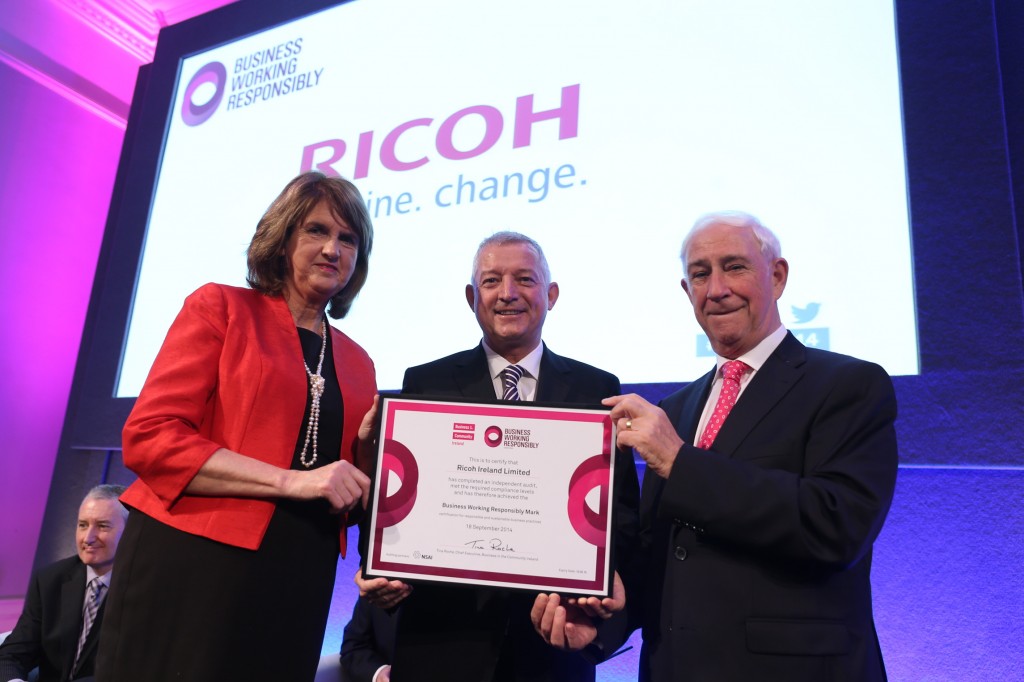CSR in Ricoh’s DNA

Pictured is Tanaiste Joan Burton with Gary Hopwood General Manager Ricoh Ireland, Kieran McGowan Chairman BITCI
Document management and print solutions provider Ricoh has been practicing good corporate citizenship since before the term was coined. Its founding principles are threefold: love your neighbour, love your country and love your work.
It’s CSR in a nutshell and it has helped the Japanese multinational win a slew of awards globally, including being named one of the 100 most sustainable corporations in the world.
“CSR is a core part of what we do, it’s in our DNA and has been since inception,” said Ricoh Ireland general manager Gary Hopwood, who has worked for the company for 33 years.
“We have always been one of the most ethical companies around. For example, our mission statement talks of the need to pursue ‘excellence to improve the quality of living’, not about sales.”
It is 15 years since Ricoh Ireland was accredited to ISO 14000, the environmental standard. In Japan, Ricoh Company received the highest gold rating in a sustainability survey conducted by EcoVadis, a collaborative platform enabling companies to monitor the sustainability performance of their suppliers, across 150 sectors and 99 countries.
In Ireland, the ‘Ricoh family’ extends to 62 people, in two Dublin locations. A Headquarters building which services it sales, services and back office functions, and a Document Production Centre.
Ricoh’s business in Ireland has been performing particularly well in recent years, enjoying strong growth and profitability, while at the same time achieving standards such as ISO 14001, ISO9001, ISO 18001 and ISO 27001 (for information security), running employee training and development programmes and organising philanthropic giving.
With so much going on, working towards achieving Business in the Community’s Business Working Responsibly Mark may seem to have only added to his workload. In fact, it supported his management.
“Why did I go for the Mark? Because we were doing so many disparate activities on the sustainability front and wanted something that would pull them all together, to show us where we were doing brilliantly but also, crucially, to identify areas in which we could improve.”
The area of community engagement was causing him most concern, he said. “The community side was the one I found most difficult. We were doing lots of activities, from four peaks mountain challenges to marathons and ad hoc sponsorships, but had never really brought all of this activity together. The Mark helped us put a more formal system of giving in place.”
Staff at the company chose one charity, Focus Ireland, to concentrate on, and partnered with ReCreate, a social enterprise that recycles surplus stock and end of line items and reuses them as arts materials for children.
“We found that partnering is a good way of measuring the impact of what we are doing. We now have a lot of activities but can see the impact they are having. And, because all of the staff have bought into it, our staff engagement surveys have shown a noticeable improvement since we started doing this too. It makes everybody feel good.”
This matters. “Activities like these help shape the culture of your company. You can have the greatest strategy in the world but unless you have the culture right, you will fail. Culture eats strategy for breakfast.”
Now that the economy is growing again, being an employer of choice has once again grown in importance. Staff morale and engagement is a key part of this.
“We have found that on the recruitment front, having strong ethical credentials are an important factor for us. After all, if x company is offering the same as y, the one with the ethics and integrity has the advantage. Our customers too are increasingly asking for evidence of our credentials, particularly in tender situations.”
Because so much of what Ricoh does is help its clients improve their own environmental performance, it’s crucial that it leads by example.
“The Mark is a great way to look at current processes and do a gap analysis of where you can do better. The fact that it is an independent survey is a huge part of its usefulness. Also, what really appeals to me about it is that it focuses not so much on what you do so much as on the impact of what you are doing.”
In a world of ‘spin’, the Mark can help consumers, employees and suppliers, separate fact from fiction.
“There’s a wealth of green washing going on out there. At Ricoh, everything we say we do on the CSR front, we are doing. But the rest of the world doesn’t know that and having to tell that story is a long story to tell. For us, the Mark is the quick way to tell it,” said James Deacon, Ricoh UK & Ireland’s head of Corporate Responsibility.
Gaining the Mark has provided the company with some less obvious business benefits too. “From a commercial point of view it is an opportunity for us to network at Mark based events with C-Suite executives at a very high level, giving us another point of entry outside of our usual ones of procurement or purchasing. We see it has having enormous networking potential,” said Deacon.
“What’s more, companies that have the Mark have been adjudged as being more sustainable. That means they are well run and those are the kinds of business that we want to do business with, because they are less likely to go belly up and leave us in the lurch. Just as our having the Mark gives comfort to our customers. There really is an awful lot of strength in this Mark.”


